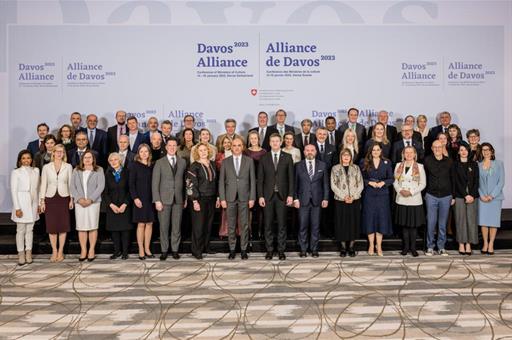Speech at the World Economic Forum
Raquel Sánchez celebrates the launch of the Baukultur Alliance and reiterates her commitment to sustainable, healthy and high-quality town planning
News - 2023.1.16
The Minister for Transport, Mobility and Urban Agenda, Raquel Sánchez, welcomed the launch of the Baukultur Alliance in Davos, of which Spain is a founding member, reiterating the commitment of the ministry and the government to the principles of the concept, already included in the Davos 2018 Declaration on Town Planning and Architecture, which calls for the need to promote sustainable, healthy and high-quality built space.
"We welcome the creation of this alliance because the only way to develop a European Baukultur is by joining forces and promoting international cooperation. The initiative is essential to address global challenges, such as climate change, inequality, public health and population growth in cities, by means of strengthening and improving our built environment," said the minister during her speech at the second conference of Ministers of Culture at the World Economic Forum, which is being held these days in Davos under the theme of cooperation in a fragmented world.
During her participation in the Forum, Raquel Sánchez was accompanied by the Secretary General of the Urban Agenda and Housing, David Lucas, and the Director General of the Urban Agenda and Architecture, Iñaqui Carnicero.
Following the conference, where government leaders discussed with private sector representatives how to achieve a high quality Baukultur in Europe, Raquel Sanchez signed the founding act of the Davos Baukultur Alliance, whereby Spain becomes part of the initiative, reflecting our country's commitment to the development of well-designed cities and buildings to improve people's quality of life by means of achieving a better balance between technical, economic, cultural and social aspects.
As the minister pointed out, the concept contributes to promoting sustainable design and the high-quality construction of buildings with the use of energy-efficient materials and systems, and to supporting the development of urban environments adapted to active mobility.
In this context, the head of Mitma also signed the joint declaration of support for Ukraine and its reconstruction in the fields of cultural heritage and architecture following the bombardment by Russia. "I would like to express our full solidarity with Ukraine and our total commitment to the future reconstruction of the country, into which all of us here present will put all our energy and efforts," she remarked.
Rehabilitation
The Baukultur concept is closely related to the New European Bauhaus and the Renovation Wave, and forms part of the foundations of the Architectural Quality Act, which came into force last June, and the policies of rehabilitation and regeneration of the building stock and cultural heritage promoted by the Ministry of Transport, Mobility and Urban Agenda.
"Spain has integrated the principles of the Davos Declaration on Baukultur 2018 into the Architecture Quality Act. This regulation states that high quality architecture can improve our well-being, boost the functionality and efficiency of buildings and contribute to the cultural and aesthetic richness of communities. It also positions architecture as an instrument to facilitate the transition to a more sustainable and inclusive environment," the minister explained.
Notably on this point, Mitma has several programmes in place for the rehabilitation of the building stock and the construction of social rental housing in energy-efficient buildings, with the aim of rehabilitating the urban landscape, improving the safety of inhabitants, developing the sustainability of the architectural landscape and facilitating access to decent housing.
Specifically, through the Recovery, Transformation and Resilience Plan, the Ministry is allocating €3.42 billion to residential rehabilitation at neighbourhood, building and housing levels; €600 million to the rehabilitation of public buildings owned by regional and local authorities; and €1 billion to the construction of 20,000 homes for social or affordable rent. These homes are part of the Affordable Rental Housing Plan that envisages the promotion of 100,000 homes through different policies.
Cultural 2%
The ministry has also signed an agreement with the Ministry of Culture to finance actions to rehabilitate Spain's cultural heritage and to promote artistic creativity with the Cultural 2%. To this end, it is reserving 2% of the budget of each state public works project to finance conservation, regeneration and enrichment work on national heritage buildings and to promote artistic and cultural activities.
This is the third time the percentage contributed to the architectural enrichment of the budgets for public works tendered by the government, which the Historical Heritage Law established at a minimum of 1%, has been raised.
In this regard, since the entry into force of the Spanish Historical Heritage Law, nearly 1,500 actions have been financed for an amount of close to €1 billion. Funding is granted through a public aid system based on the principles of competitive tendering, transparency and publicity.
Non official translation





